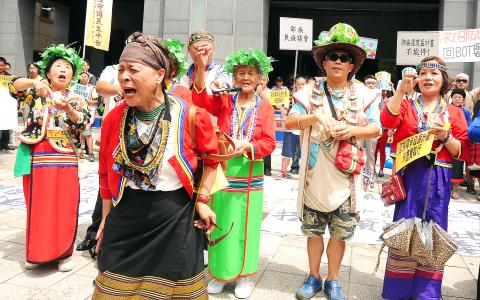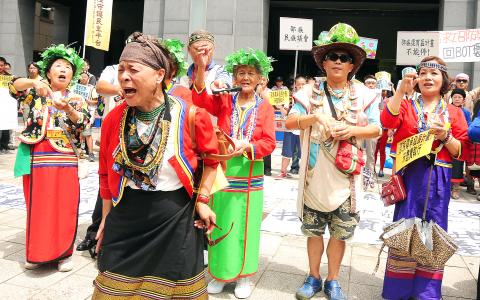An Environmental Impact Assessment (EIA) assembly yesterday afternoon conditionally approved a build-operate-transfer (BOT) resort project in Nantou, despite protests earlier in the day by Thao Aborigines, who argued that the project would occupy their traditional land near Sun Moon Lake (日月潭).
Late last month, when the project gained approval during an ad hoc EIA meeting, a number of representatives of the Thao people voiced their objections, saying that the approval of the project contravened the Aboriginal Basic Act (原住民基本法), as the developers did not consult the Thao Aborigines and gain their consent in advance.
In protests on Ketagalan Boulevard and later in front of the Environmental Protection Administration (EPA) in Taipei yesterday, protesters, in traditional Thao clothing, called on the EIA to reject the project with protest banners that read: “Protect Aboriginal homeland, stop the plunder,” “Rescue the Thao, reject the BOT project” and “Return our land, the Nantou Government is repressing the Thao.”

Photo: Liu Hsin-de, Taipei Times
Thao National Council chairman Banu Bagamumu said that they are angry with the developer for reporting to the Sun Moon Lake National Scenic Area Administration that the tribe members agreed to the project in an information session with residents living near Sun Moon Lake, and that the agency did not even confirm with Thao tribe members before reporting to the previous EIA meeting.
“The Thao tribe has the smallest population among the Aborigines in Taiwan, yet the government still represses it by robbing it of its land and resources,” said Taiwan First Nations Party founding chairman Runquan Lhkatafatu, a Thao, adding that they are against the project and refuse to accept promised employment positions at the resort.
They restated that the area surrounding Sun Moon Lake is the Thao’s traditional territory and that the Thao culture and living restoration park promised by the central government in 2008 should be built, adding that the BOT resort project review should be halted until it gains consent from the tribe members.

Photo: Liu Hsin-de, Taipei Times
During the EIA general assembly meeting, several representatives of the protestors blocked the projector screen when the developer made its report, in an attempt to stop the meeting.
However, the EIA committee members still decided to give conditional approval to the project through a voting session late in the afternoon.

Beijing could eventually see a full amphibious invasion of Taiwan as the only "prudent" way to bring about unification, the US Department of Defense said in a newly released annual report to Congress. The Pentagon's "Annual Report to Congress: Military and Security Developments Involving the People's Republic of China 2025," was in many ways similar to last year’s report but reorganized the analysis of the options China has to take over Taiwan. Generally, according to the report, Chinese leaders view the People's Liberation Army's (PLA) capabilities for a Taiwan campaign as improving, but they remain uncertain about its readiness to successfully seize

Taiwan is getting a day off on Christmas for the first time in 25 years. The change comes after opposition parties passed a law earlier this year to add or restore five public holidays, including Constitution Day, which falls on today, Dec. 25. The day marks the 1947 adoption of the constitution of the Republic of China, as the government in Taipei is formally known. Back then the Chinese Nationalist Party (KMT) governed China from Nanjing. When the KMT, now an opposition party in Taiwan, passed the legislation on holidays, it said that they would help “commemorate the history of national development.” That

Trips for more than 100,000 international and domestic air travelers could be disrupted as China launches a military exercise around Taiwan today, Taiwan’s Civil Aviation Administration (CAA) said yesterday. The exercise could affect nearly 900 flights scheduled to enter the Taipei Flight Information Region (FIR) during the exercise window, it added. A notice issued by the Chinese Civil Aviation Administration showed there would be seven temporary zones around the Taiwan Strait which would be used for live-fire exercises, lasting from 8am to 6pm today. All aircraft are prohibited from entering during exercise, it says. Taipei FIR has 14 international air routes and

Snow fell on Yushan (Jade Mountain, 玉山) yesterday morning as a continental cold air mass sent temperatures below freezing on Taiwan’s tallest peak, the Central Weather Administration (CWA) said. Snowflakes were seen on Yushan’s north peak from 6:28am to 6:38am, but they did not fully cover the ground and no accumulation was recorded, the CWA said. As of 7:42am, the lowest temperature recorded across Taiwan was minus-5.5°C at Yushan’s Fengkou observatory and minus-4.7°C at the Yushan observatory, CWA data showed. On Hehuanshan (合歡山) in Nantou County, a low of 1.3°C was recorded at 6:39pm, when ice pellets fell at Songsyue Lodge (松雪樓), a